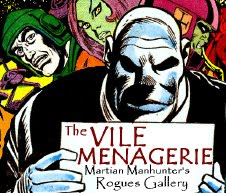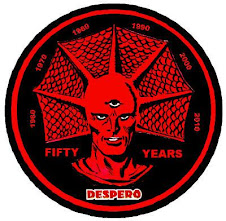
Mark Waid, former BOOM! Studios Editor-in-Chief and decades long top comic book writer.
Q: “How many people have heard of Martian Manhunter?” A: Every cartoon-watching kid in America.
J'onn Jones AKA Martian Manhunter was played wonderfully by @thephilmorris . Millions of people watched him. Half of them were women.
— Shades of Limelight (@CertainshadesL) May 21, 2014Based on his "jokes" about She-Hulk and Martian Manhunter, I now get why David Goyer never includes any comedy in his screenplays.
David Goyer insults people who have heard of Martian Manhunter. He's good at insulting people - he wrote Man of Steel, after all.
— THD (@hfcthd) May 21, 2014The Martian Manhunter is goofy. But a guy dressed up in a bat costume is not. Weird priorities sometimes, and arbitrary lines.
As to David Goyer's comments on Martian Manhunter: they're exactly why Marvel has a thriving stable of film properties, and DC has Batman.
— Ryan (@tuaiscirt) May 21, 2014He doesn't get Superman. He doesn't get She-Hulk. He doesn't get Martian Manhunter. Ditch Goyer already, DC. I'm afraid for Wonder Woman.
Marvel’s got Ultron, Scarlet Witch, and the Infinity Gauntlet on the way and DC’s screenwriters are calling Martian Manhunter fans nerds.
— Aaron Diaz (@dresdencodak) May 21, 2014It's been said before, but Goyer almost appears to be ashamed that he's even associated with comic book films. So it is that the best he can come up with, when asked about one of DC's most interesting properties, is to delete any trace of the his origin story, misunderstand core aspects of his character, and saddle him with a genericized sobriquet so hackish it almost belongs in a Matrix sequel and plot points that reflect the worst cliches of the last 20 years. I can't argue that Martian Manhunter isn't as well known as Superman, Batman or Wonder Woman. But using obscurity as an excuse to ignore him shows a painful lack of imagination. Marvel has made billions producing movies about ancient Norse gods and talking raccoons. Meanwhile, DC's attempt to copy Marvel is being run by someone who thinks the lone survivor of an ancient Martian civilization is too nerdy for audiences to accept. Make of that what you will.
Goyer's remarks on Martian Manhunter, no 'With great power' in ASM, Singer ruining X characters - only Marvel respects the source at all.
— Devin Faraci (@devincf) May 21, 2014Goyer and I are in small agreement: I also felt that in many ways the Martian Manhunter was a green clone of Superman. He had most of the same powers and, instead of Kryptonite, his weakness was fire. When Tom and I did our series, we wanted to focus on what made him and Superman different. The principal one was that, while born an alien, Kal-El came to earth as an infant and was raised as a human. His values are Midwestern values. J’Onn came to earth as an adult; he was raised in a Martian culture. He’s not American; he is fundamentally alien – a Martian.
Tom and I decided we would investigate and explore Martian culture in our version. He was telepathic; his race was telepathic. What did that mean? What were the societal rules? Rape, for example, would not only be physical; it could be emotional and mental. On the flip side of the coin, sex would involve a melding of minds as well as a melding of bodies. With his race dead, J’Onn would be forever denied that. He could never again experience physical love on so deep a level.
Martians could fly, levitate, and pass through walls; their houses would have no doors or windows or stairs.
J’Onn can turn invisible; we had it that, on arriving on Earth, he saw and experienced how violent and paranoid humans can be. He chose a persona that allowed him to act like a human in order to better understand who and what we were. We had him having several other human identities as well (credit where credit is due: Grant Morrison first brought up that concept).
The idea that he would be grown from a Petri dish is not an uninteresting idea for a character; it’s just not J’Onn J’Onzz. I talked last week about being true to the fundamental aspects of a character and, to my mind, Goyer’s take on the Manhunter from Mars isn’t it. (Sidenote: why is he the Martian Manhunter? Because there are already plenty of other Manhunters in the DCU.)
This might not matter but Goyer is right now the go-to writer for DC cinematic stories. If he has this little fundamental understanding of a mainstay DC character, how much will he have for other DC characters? It’s not that hard to check on what has been done; the Martian Manhunter entry on Wikipedia takes only a few minutes to read and its pretty accurate.
i'm pretty sure this job is getting to me, as i woke up at 3:00 AM and said, "martian manhunter is NOT stupid" and burst into tears
— Tom Spurgeon (@comicsreporter) May 23, 2014It’s also really telling that Goyer thinks Martian Manhunter is shooting low by becoming a homicide detective in his civilian identity — you know, literally fighting crime all the time on both large and small scales. This is the man who wrote a superhero movie where Superman had to be prompted into becoming a superhero at all by two dead fathers, and who could probably go listen to the President’s heartbeat just to be sure everything’s going all right in the time that it takes him to pretend to ride a bike to his job at a newspaper. Dare to dream!
...Goyer’s got a point. Martian Manhunter is a relatively obscure character. Despite being featured in almost every incarnation of the Justice League, despite multiple attempts to brand him as a solo hero, he’s never caught on. He’s always a supporting character in someone else’s book, taking a back seat to more iconic characters, and I have my doubts that there’s a way to do a movie that could really make him stand out in his own right.
You know, sort of like Blade.
But it’s not Martian Manhunter’s status as the D-lister of the Justice League that’s really the point here. The point, made abundantly clear by Goyer in his remarks, is that he doesn’t really understand why anyone would come to Earth from a dead planet and decide to devote their life to helping others, which is a pretty terrible quality for a person writing multiple films about Superman to have. A super-powered alien who helps people, you see, is silly. It should be a revenge-fueled rampage culminating in a sex joke at the expense of a female character, because that’s smart and mature. This is the thought process that leads to a movie where Superman’s response to a genocidal villain claiming the hero can only win by breaking his code against killing is to do just that, and then smile cheerfully while a woman stands in the background talking about how sexy he is.
Spoiler warning in case you haven’t seen it: That’s exactly how Man of Steel ends... Goyer’s heroes are uncomfortable with the idea of altruism. Everyone’s out for revenge, everyone has to be pushed and prodded and dragged to do the right thing — that is, if they ever get around to doing it at all.
That’s not what superheroes — particularly DC’s heroes — are about, and yet, here’s the guy in charge of bringing them to the widest possible audience, in films soaked with shame and contempt, where a character like Superman can’t exist in a world with anything brighter than a medium grey. Goyer’s pushing against what the characters are about instead of embracing them for what they are, because he’s too afraid of making something that might be considered silly.
I just like She-Hulk and Martian Manhunter so much.
— Alan Sizzler Kistler (@SizzlerKistler) May 21, 2014My #FreeComicBookDay featured Martian Manhunter cupcakes, so time time for a #Marsparty. cc: @HHComics pic.twitter.com/1wZX0vhumR
— Devin R Brews (@Doctor_Teeth) May 3, 2014





























3 comments:
Goyer comes across as a frat boy who believes that in discovering that not everything in the universe resembles My Little Pony that he has gained wisdom to rival King Solomon. Instead, he is much closer to Solomon Grundy in misunderstanding complex characters. A Golden Age view of characterization is naive but so is the cynic's version.
I am pleased with these comments which make many of my points. J'Onn. whom I view as a survivor and not a loser (although he is well acquainted with grief), acts in an ethical fashion to help his adopted world. He may be low key in his civilian identity, but perhaps he spends some of his spare time trying to help people understand each other better in times of crisis. (I got a humorous image of J'Onn being a barber talking to a White House official during the Cuban Missile Crisis and trying to help things.)
Considering Goyer's respect for characters, or should I say the utter lack thereof, he should reconsider his writing career. Perhaps he could write sarcastic messages on fortune cookies.
"But using obscurity as an excuse to ignore him shows a painful lack of imagination." That's the real nail on the head, there. A good writer can write a good story out of any source material.
The Tom Spurgeon one made me laugh, because that was basically my reaction, too.
I liked how Chris Sims picked up on the detective angle--because why isn't it heroic to be a detective?
Nice overview. I'm glad this made waves all over the Internet.
I could use more sarcasm in my fortune cookies. The lotto numbers and sappy inspirational messages I usually get don't make cracking into one worthwhile. Given my druthers, I'll take an Andes mint either way, though.
Post a Comment